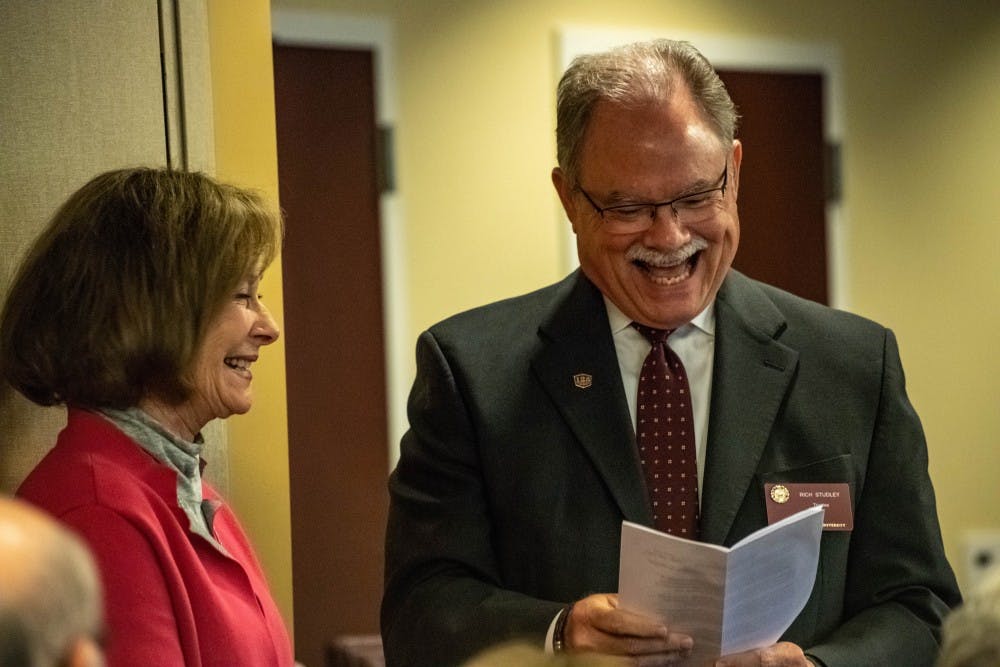Board of Trustees approve Chippewa Champions Alumni Center, discusses future of Barnes Hall

Trustee Richard Studley laughs before delivering Emeritus status during the Board of Trustees meeting Sept. 27 in the President's Conference Room.
The Central Michigan University Board of Trustees unanimously voted to support the construction of the $32.5 million Chippewa Champions Alumni Center at its Thursday, Sept. 27 fall meeting in the President's Conference Room.
Board chair William Weideman said funding for the project is nearly complete. Much of the funding will come from the game guarantees in upcoming football seasons. The university will continue to raise funding through donations and naming opportunities. The remainder of the cost at the time construction will be covered with the university's facilities reserves. That fund will be replenished as funds are received from other donations.
"Right now, between game guarantees and firm pledges, approximately two-thirds of the total cost is covered," he said.
Fundraising through the Athletics Department has raised about $7 million for the project, which Weideman said is “100 percent” of the amount they were tasked to collect through donations. Advancement will contribute $5 million toward construction and move its department out of the Carlin Alumni House.
Trustee Tricia Keith said the project has been part of the university’s master plan since 2013. Though they approved the project today, Keith said it has been discussed with the CMU community for years.
Vice President of Finance and Administrative Services Barrie Wilkes said construction of the new facility will begin after the 2019 football season.
"The plan right now is that the (new) scoreboard will be finished by early next summer,” Wilkes said. “We're talking a year of design, so construction will start a year from now."
During the construction process, it’s likely that student athletes will have to use portable locker rooms for an entire football season.
Trustees were quick to point out that the facility will house more than just athletics. The facility will act as a “Welcome Center” and become the new home of Advancement, Alumni Relations and Athletics, according to Robert Martin, Vice President of Advancement.
The board also discussed the possible closing of Barnes Residence Hall. Trustees cited high maintenance costs for the 67-year-old building and American Disability Act compliance issues, such as doorways which are not wide enough to be considered accessible.
"We started having discussions within the last year about Barnes," Wilkes said. "The reason we brought it to the board as a discussion item, rather than an action item, was because we wanted to have discussion with the campus community. It's part of a larger student residence life decision."
That larger decision could include the creation of two residence halls on south campus, but the halls would be built after Barnes is decommissioned.
If Barnes is closed, 203 students would have to live in other residence halls on campus before the additional halls were built on south campus, a feat trustee William Kanine said would be possible with the university's existing facilities.
At his first meeting as president, Robert Davies outlined his overall goals for CMU.
"Over the next several years, we will be bold, we will be decisive, we will be intentional, we will use data to make important decisions, we will enforce our academic programs (and) rigor and make sure we remain relevant and excellent in all we do," he said. "We have that strong foundation to build on."
After the meeting, Davies told reporters he will continue to elaborate on the successes and potential of CMU, while talking about the challenges the university faces. He said it will be his attempt at promoting "radical candor" and creating a foundation of trust with the university community over transparent communication.
Davies was able to celebrate the successes of the university during the meeting as 12 faculty members were awarded emeritus status. Faculty who have earned the title of emeritus must have at least 10 years of service to the university and go through the Board of Trustees for the approval of the title.
During the meeting's public comment portion, two students voiced their thoughts on current campus news.
Twin Lake senior Elizabeth Colvin addressed a recent subject discussed during a recent Academic Senate meeting: the administration's consideration of requiring students to lock into two years of classes. Students currently commit to a single semester, but due to student retention issues, the Academic Senate proposed students should be required to commit to a full two-year schedule.
"We're losing more students than we are (retaining) than in previous years," Colvin said. "But committing students to two years of classes? Instead of giving them more options, we're limiting them. If a student changes their major — and the average student does — they're going to be locked into those courses."
There is no confirmation if or when the two-year schedule commitment will be implemented.
Saginaw senior Bryan Fettig addressed the board about the new $225 Student Service Fee that went into effect this fall. Fettig said he thinks the fee was well-intentioned because provisions go toward counseling services and academic advising, but other, more effective measures could be taken.
Fettig suggested the subsidization of academic advising online in programs like "Degree Progress," rather than in-person, and said the fee may add to mental stresses even though the point of the funds is to help reduce mental health issues.






